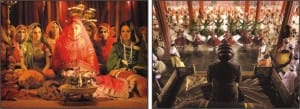“Jodhaa Akbar”: Once upon a time in India

Scenes from the film
They may not make them like they used to in Hollywood, but sometimes in India they still do. Jodhaa Akbar, a historical romance directed by Ashutosh Gowariker, is filmmaking on the grand scale of Cecil B. DeMille, with romance, stirring battles, a cast of thousands and enough elephants and gold to sink the Titanic.
With so much attention focused on Islamic extremism, now seems an apt time for a movie about Akbar, the 16th-century Mughal emperor of India, whose legacy is one of enlightened rule and almost radical religious tolerance. Jodhaa Akbar begins before all that, when the young Akbar is still busy expanding the Mughal empire. This gives Gowariker a chance for some cinematic derring-do -- in one spectacular shot the camera rushes back to avoid being trampled by two armies -- and to show the seeds of what made Akbar one of history's greatest rulers. He fights with purpose (to consolidate Hindustan) but not without mercy.
The battles, though, are really a windup to the love story that propels the film. Forging a political alliance, Akbar marries Jodhaa, a feisty Rajput princess, and then sets out to win her heart. These royals are played by Hrithik Roshan and Aishwarya Rai Bachchan, two rather astonishing specimens of human beauty. Neither is a great actor, but both know what's required of a star and seem to the palace born.
Rai makes Jodhaa's wilfulness a sign of character, especially when she lays down the conditions for her marriage: She will remain a Hindu and would like a small temple to Krishna in the Mughal fort. As Akbar, Roshan, has the bearing of a king, yet can seem a little blank when not in motion.
Jodhaa's personal temple to Krishna within the Mughal qilla in Agra infuriates the court's influential Muslim clerics. Despite this inauspicious start, Akbar and Jodhaa gradually realise they have much in common, and they begin to fall in love despite the political turmoil around them. But though Jodhaa finds a surprising ally in her mother-in-law, Mallika Hamida Banu (Punam S. Sinha), she has an equally powerful enemy in Maham Anga (Ila Arun), who nursed the emperor when he was a baby and thus secured the position of the most influential individual in the palace. Maham Anga sees the Hindu queen as a threat to her own influence, which she has used to further the ambitions of her dissolute son, Adham Khan (Shaji Choudhary). In addition, Jodhaa's beloved brother, Sujamal (Sonu Sood), is plotting to seize his birthright, which his father inexplicably bestowed on another, and highly placed nobleman Sharifuddin Hussain (Nikitin Dheer) who is also the emperor's brother-in-law, is conspiring to depose his master and seize power for himself.
At -- fair warning -- three and a half hours, the film is too long and is crammed with huge battle sequences, court intrigue, swordfights, lavish sets and stunning costumes. There's something to look at even when there's nothing going on. The film lacks conventional Bollywood production numbers, but there are plot-driven dance sequences. Like most of the recent scores by A.R. Rahman, songs of Jodhaa Akbar are not targeted towards the South Asian masses. These songs rather grow on you, like the ode to the legendary Sufi saint Khawaja Moinuddin Chishti by swirling dervishes in a trance, or Jodhaa's humble offering to Krishna, or the subtle romantic number that captures the blossoming love between two strangers.
Gowariker's Lagaan (2001), a classic root-for-the-underdog story, was one of the rare Bollywood movies to attract a non-South Asian audience. Jodhaa Akbar may lack that film's populist appeal but it shares its sense of national purpose and could just as easily have borne its subtitle: “Once Upon a Time in India.”
Jodhaa Akbar is not a history lesson: where, for example, are Akbar's 199 other wives, or the artists and poets who made his court a fabled one? The film was greeted with vociferous complaints of historical inaccuracy involving Queen Jodhaa's name; though one of Akbar's many wives was Rajput royalty, the name Jodhaa (or Jodhabai) apparently belonged to his daughter-in-law. The epic Indian movie Mughal-e-Azam (1960) is blamed for popular confusion about the matter, and feelings run so high in Rajasthan that Jodhaa Akbar was not released there. It did, however, open in more than 100 U.S. venues, the largest-ever release for a Hindi film.

 For all latest news, follow The Daily Star's Google News channel.
For all latest news, follow The Daily Star's Google News channel. 



Comments